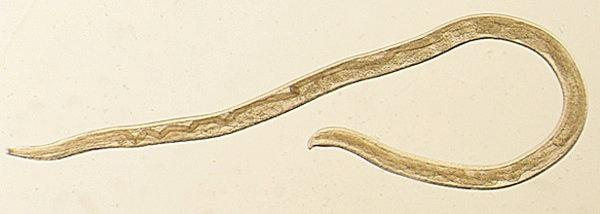
This might sound like a creepy nightmare but it is true. 'Parasitic eye worms' which are commonly found in dogs, cats, pigs, sheep, goats, and wild carnivores like foxes and wolves have now entered the human eye.
On February 12, a research by US Centers for Disease Control and Prevention stated that in a first of a kind case, a psychology student from Oregon, US, Abby Beckley became the first person to have a tiny worm in her eye.
It was in August 2016 that 28-year-old Beckley was spending her summer on a fishing boat in Alaska when the irritation which she had been experiencing over a three-week period aggravated. Then she decided that it was enough heck she has endured, it was time to get over it.
When she plucked at her eyeball, there was a wriggling translucent worm which lived for five seconds and then died.
Surprised and taken back with what exactly she saw, she ran to her bunkmate and showed her that worm. Seeing it, she too confirmed that it was a worm.
Initially, she thought the worm had fallen from somewhere as she was fishing, but later when the irritation continued, she pulled out a few more. Later, she decided to look for a treatment.
According to US Centers for Disease Control and Prevention scientists, “We extracted 14 translucent parasitic worms of the species Thelazia gulosa from Beckley eyes. Most of them were 1.27 cm long.”
Giving more details on what exactly this species of worm were, the researchers said, “Usually this species of 'Thelazia worm' was mostly seen in cattle’s in the northern US and southern Canada.”
When asked, to what extent is this worm vulnerable, the researchers said that if the worms stay in a person's eye for a prolonged time, then corneal scarring and permanent eyesight lose can happen.
Reason behind the infection
There have been many cases of such eye worm infections worldwide, predominantly in Europe and Asia. Mostly people residing in rural area, staying in proximity to animals have chances of getting this infection.
The possible reason behind Beckley having eye infection is the frequent outdoor pastimes during the summer months exposed.
Are the worms permanently gone

After the worm was identified, there wasn’t much doctors could do. They did not give her anti-parasitic medicine because they were worried that a dead worm might remain in her eye. Rather, it was the patient herself who has to monitor her eyes and remove any worms she found.
Treatment killed the parasite but the chances of occurrence always exists. In this kind of infection it is only the patient who can extract the worms.
First published: 13 February 2018, 14:58 IST



